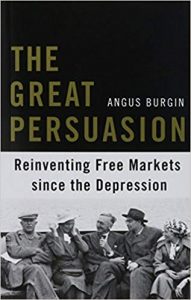I’ve polished off Angus Burgin’s The Great Persuasion, recommended to me by a colleague after Daniel Stedman-Jones’s Masters of the Universe cropped up in conversation. I read the latter when it came out in 2012. It made a strong impression on me with its account of the way the creation of the climate of ideas conducive to Thatcherism and Reaganism came about as a conscious long-term project on the part of a number of free market think tanks on both sides of the Atlantic, as well as some leading economists.
Of these, Milton Friedman, features as the key figure in The Great Persuasion. This is an account of the same political project, told through the evolution of the Mont Pelerin society specifically. At its 1947 formation, it was both firmly interdisciplinary, fostering a debate about society’s moral values as well as its economic organisation, and also resigned to the interventionist climate of the times. The Victorian laissez faire version of liberal markets was firmly rejected. The aim was to ensure there remained space for market forces in the context of the Keynesian, planification spirit of the times.
However, as the postwar decades went by, and founding figures moved on (with some acrimony in some cases), Milton Friedman’s vision came to predominate. The society turned into an economics-only shop. Conservative foundations funded ever-more free market research. The restrained neoliberalism of the 1950s – so named as a contrast to laissez faire liberalism – gave way to the harsher, ‘neoliberal’ version of the 1980s on.
Two things particularly struck me in reading the book. One was the importance of patient funders, not demanding short term political ‘impact’, but instead understanding that the wider intellectual climate needed to change and they would be in for the long haul. The other was the conviction of both Hayek and Friedman that ideas can move mountains. Burgin writes: “Friedman maintained a relentless faith in the ability of unpopular ideas to gain recognition and over the course of decades to effect political change.” I share the view that ideas are powerful but am less sure it always needs decades: people seem able to jump from one moral universe to another relatively quickly, as we have seen in other contexts.

